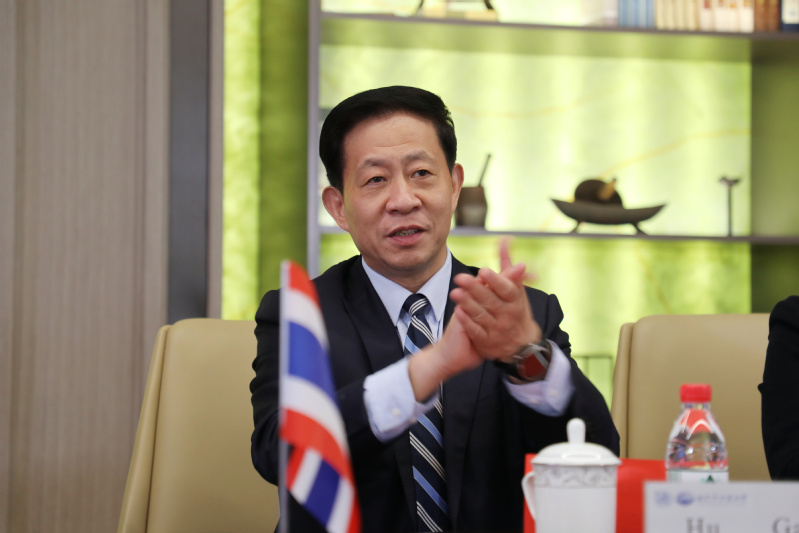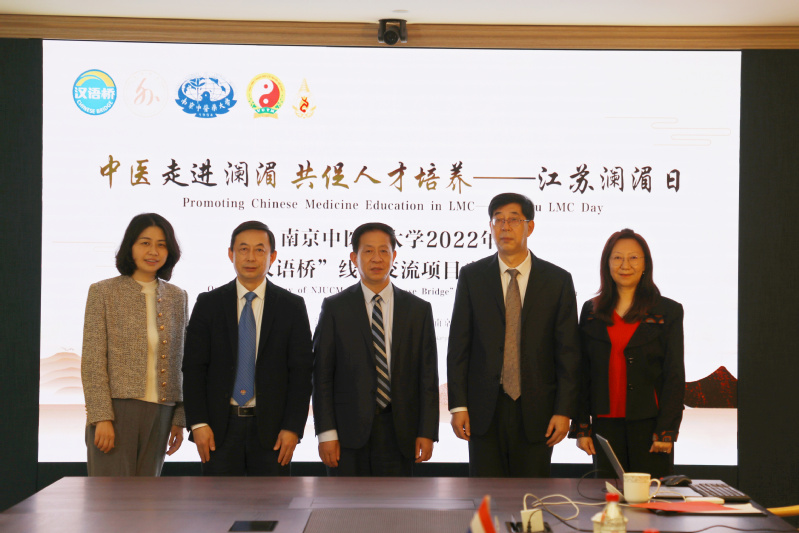

On April 2, NJUCM and the Foreign Affairs Office of Jiangsu Provincial People's Government jointly hosted the launching ceremony of the 2022 NJUCM Chinese Bridge Online Exchange Project with the theme of letting TCM enter Lancang-Mekong Cooperation and promoting talent training. Branch venues were set up at Mae Fah Luang University of Thailand and Vietnam University of Traditional Medicine.
Hu Gang, President of Nanjing University of Chinese Medicine, Huang Xiqiang, Director of the Foreign Affairs Office of Jiangsu Provincial People's Government, Ning Chenggong, Consul General of Vietnam in Shanghai, and Leda Puma, Consul General of Thailand in Shanghai attended the ceremony and delivered speeches. Chayaporn Wattanasiri, President of Mae Fah Luang University of Thailand, Ruan Deming, Vice President of Vietnam Central Acupuncture Hospital, and Huang Huang, Dean of NJUCM International School of Jingfang attended the ceremony. Representatives of teachers from NJUCM, MFU and VUTM, representatives of doctors from Vietnam Central Acupuncture Hospital, and all students of the program attended the ceremony. The launching ceremony was presided over by Sun Zhiguang, Vice President of NJUCM.
Hu Gang pointed out that since the launch of the Lancang-Mekong cooperation (LMC) mechanism in 2016, it has become a new highlight of China-ASEAN cooperation and even China's neighboring diplomacy. As an important base for foreign cooperation and exchanges of Chinese medicine in China, NJUCM aims to take Chinese language as a bridge and TCM as the road in order to boost the international dissemination of Chinese language and TCM culture through the program. NJUCM will continue to strengthen cooperation and exchanges with Lancang-Mekong countries, strengthen the training of traditional medicine talents, and build an international TCM medical treatment and health service platform to jointly promote the health and well-being of the people of the six Lancang-Mekong countries.

Hu Gang delivered the speech.
Huang Xiqiang pointed out that the LMC mechanism has made great contributions to the exchanges between Jiangsu and the Lancang-Mekong countries which have become important partners for Jiangsu to help build the Belt and Road Initiative and build a new development pattern of Dual Circulation. The two sides lead pragmatic cooperation through local exchanges and mechanism construction; promote common development through economic complementarity and park construction; and strengthen Lancang-Mekong friendship through health cooperation and educational exchanges.

Huang Xiqiang delivered the speech.
The Chinese Bridge project was initiated by the Center for Language Education and Cooperation of Ministry of Education and is dedicated to the promotion of international Chinese education. NJUCM has communicated with partner universities in Thailand and Vietnam for many times to fully understand the expectations of the students, carefully design the curriculum system and content, and integrate high-quality educational resources. This program will use live teaching, recording, visit on the cloud, virtual tours and other teaching methods, and will be taught by experts who have long been engaged in the teaching of Chinese language, Chinese medicine culture, acupuncture and massage and Chinese medicine exercises for international students. 211 trainees will complete Chinese language, TCM culture and other courses on TCM in nearly 4 weeks of study.

Group photo of the representatives attending the launching ceremony of the program
2022 marks the sixth anniversary of the launch of the Lancang-Mekong Cooperation and the fifth Lancang-Mekong Week event. The Lancang-Mekong countries are close to each other geographically and culturally. Medical care and health, as people's livelihood issues of general concern in all countries, carry people's yearning for a better life. In the future, NJUCM will continue to strengthen the cooperation and exchange of traditional medicine education among the universities of the six Lancang-Mekong countries, enhance mutual trust, and jointly protect the health and well-being of the people.




